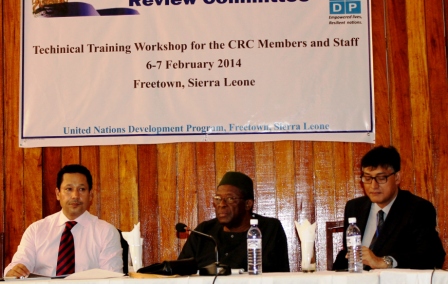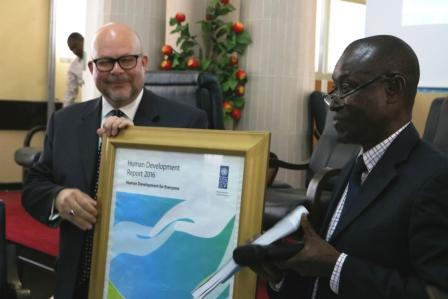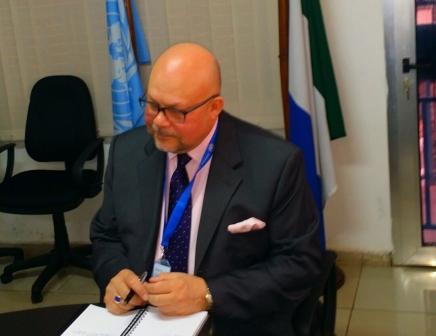Constitutional review process must be owned by the people of Sierra Leone
UNDP Country Director calls for the constitutional review process to promote social justice, peace and prevent the repetition of violent political conflict.
Freetown, 7th February 2014 – UNDP Country Director, Sudipto Mukerjee, has said at a technical workshop organized for members of the Constitutional Review Committee (CRC) that “The constitutional review process must be owned by the people of Sierra Leone.” Delivering a keynote statement at the workshop at the Bank of Sierra Leone Complex, Kingtom, in Freetown, he added that the review of the constitution must “…promote social justice, consolidate peace and prevent the repetition of violent conflict that Sierra Leone has witnessed in its recent past.” The workshop ends today 7th February 2014. (Photo: Left to right – UNDP Chief Technical Adviser, Constitutional Review Project, Sanaullah Baloch, Chairman, Constitutional Review Committee, Justice Edmund Cowan and UNDP Country Director, Sudipto Mukerje)
Chairman of the CRC, Justice Edmund Cowan, who attended the workshop, along with representatives from civil society, academia and various technical experts drawn from the UNDP, said that these technical sessions will help the committee undertake an informed constitution making project that will ensure that “…the people own the process.”
UNDP’s Chief Technical Adviser on Constitutional Review, Sanaullah Baloch highlighted the importance of the process of the constitution making as more important than the outcome, emphasizing that “the constitution cannot be legitimate if the process is not people-driven.” Adding “…this process is essentially a national dialogue.”
He told the audience that there is a strong need for a strategic plan for the whole process followed by various work plans and operational plans.
In the next two days, the meeting will examine various issues including natural resources, land and environment, constitution making and the legislative branch, public service reforms, legal reforms and elections, public finance and fiscal transparency in the constitutional framework and oversight and accountability for peace and security.
Background to the Constitutional Review process:
Sierra Leone currently operates on the basis of the 1991 Constitution. The Constitution signaled an end to one-party rule and ushered in a new political dispensation of multi-party democracy. However, the Constitution was endorsed three months after the civil war broke out. As part of the process of negotiating the end to the civil war, Article X of the July 1999 Lome Peace Accord provided for a review of the Constitution. Subsequently, the Truth and Reconciliation Commission (TRC), established in 2002 also urged the Government of Sierra Leone to give “serious consideration” to the creation of a “new constitution”, in order to contribute to human rights.
To that end, a broad ranging Constitutional Review Committee (CRC) representing different stakeholders in society, including political parties, democratic institutions, NGOs, the media and key independent bodies has been appointed. The 2013 CRC has been tasked with the reviewing of the 1991 Constitution. As part of its work it is envisaged that CRC will undertake a major civic education and consultation process, which will engage all segments of society in identifying recommendations for constitutional change.
This project, managed by UNDP and implemented in close cooperation with UNIPSIL and the Office of Attorney General and it is expected that the intended project output of Sierra Leone’s Constitutional Review Committee capacitated to expertly lead an inclusive, transparent, participatory and peaceful process of constitutional reform would have been achieved.
UNDP
Stay with Sierra Express Media, for your trusted place in news!
© 2014, https:. All rights reserved.






